So, what made you see Oculus? The fact that it’s produced by WWE studios?
No, though that was a surprise. I saw it because it was the only thing playing at the drive-in that we both wanted to see.

The drive in? Did you go for malts after? Were you wearing your poodle skirt?
Drive-ins are the only way to go these days, if you’re fortunate enough to live near one. First off, they’re significantly cheaper. More importantly, you watch the movie in the isolation chamber of your car. Kids. Teens. Tweens. Texters. Noisy eaters. Yappers. Assholes who get all pissy because you to put your feet up on the chair in front of you, just because their girlfriend is sitting in it. None of them can hurt you anymore. Plus, you can bring whatever you want to eat or drink or smoke. How did non-drive-ins ever even get off the ground?
So the fact that Oculus was playing was incidental. You’re just a cheapskate who wants to smoke crack and watch movies while pantless.
Yes, but it turns out that this is an excellent horror movie. Potentially a classic. I can easily see myself flipping through the channels 20 years from now and being like, ooooh, Oculus!
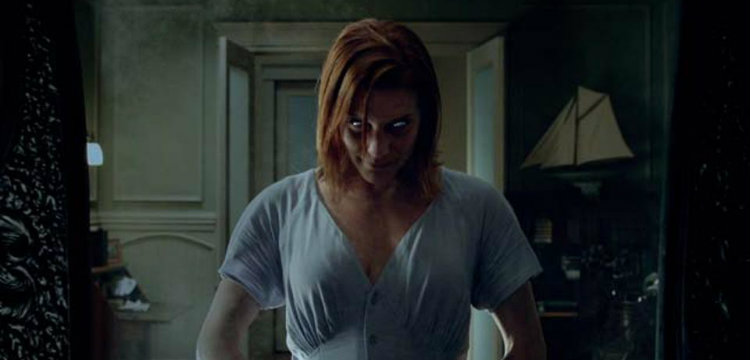
That’s funny, because I thought it was a movie about a ghost mirror.
It is! But it’s an excellent movie about a ghost mirror. Possibly the best movie ever made about a ghost mirror.
Let’s start with the basics.
Well, the basic story is that a well to do young family comes into possession of the mirror. The mirror is haunted and gains influence over the parents and tries to set up a family annihilator scenario. The kids escape, the parents die. The brother, who kills the father, is institutionalized and, during his therapy, becomes convinced that none of the supernatural stuff ever happened. The sister remains convinced that it did happen and as an adult, uses her job as some kind of antiques dealer to acquire the mirror. The brother gets let out of the loony bin and she recruits him in her quest to 1) document that the mirror is haunted and therefore responsible for what happened to her family and 2) destroy it.
How do they squeeze that in?
Very tight storytelling. The movie cuts back and forth between the siblings’ confrontations with the mirror in childhood and as young adults. As the sister tries to convince the brother that the mirror is haunted and that his psychiatrists have brainwashed him, we see the young family of the past experience the early stages of the haunting.
MIRROR images?
Yes. As the present haunting takes effect and the two storylines begin to parallel, the adult characters find themselves falling into the past, becoming children, reliving past events and combining them with the present.
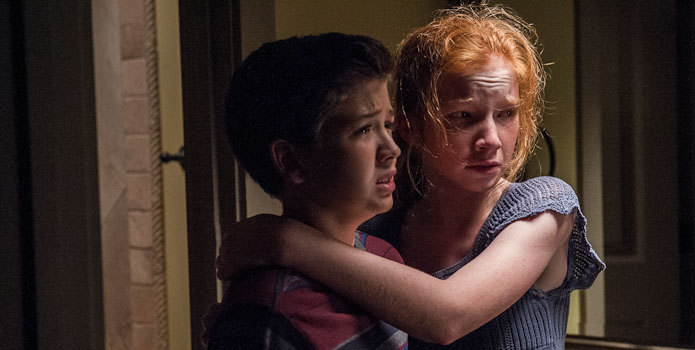
Is that psychological or is the mirror distorting their perceptions so they think they’re actually children again or are the filmmakers choosing that imagery to convey the commonality of the two experiences to the viewers?
I think it’s all three. And all of this is well done. The acting is very good, including the little kids. The writing is excellent. I’ll give you a couple of lines I really liked. In the early stages of the first haunting, the little girl is being a pain in the ass and the mom sarcastically says, “the fruit of my loins!” and the girl says, “I wish I had been a pineapple!” You know because pineapple is a fruit and it would be really painful to give bir…
I get it! Jesus. Just like I got the mirror thing with the two stories. I’m not Richard Roeper.
OK, sorry. There’s another line, after the mirror-generated family problems start. The mom is walking away from the dad and hears him call her a “grotesque cow.” And she just freezes, stunned by the harshness of the words. A lazier writer would have just thrown in a generic insult, like “stupid bitch. Grotesque cow” is cutting. It sounds original, like a sincere expression of malice meant specifically her. It’s not just a profanity you might toss out to express your own anger. So, anyway, the whole movie is very high quality. Really well written. No plot holes. No pointless twists.
So, are we to the part where you give all your half-baked interpretations of the film yet?
Yes!
Crap.
Well, as you know, I generally think that when a really good movie has deeper meanings, it’ more about being evocative than the movie dictating some message. The movie works from some basic themes and expresses them, and this stimulates us, sometimes in ways we don’t fully realize, and that makes the movie ring with truth. So, when I looked at Oculus I saw the reflection of some other things.
Let’s start with the simple stuff and get progressively crazier.
Sure. Well, a big theme in the story is systems of authority and the patriarchal element of such systems. At times it reminded me of Haneke’s The White Ribbon.
Oh, sure! How could you NOT think that?
Shut up. So, The White Ribbon is about early 20th century Germany and patriarchal systems of authority and the abuse that occurs in those systems, and we all know where that led. But part of what I took away from the film was the inevitability of it all. For example, you’ve got a father in some small village 100 years ago who provides well for his family but you suspect he is molesting his daughter. What can you really do about it?
Kill him!
Then what?
Oh yeah.
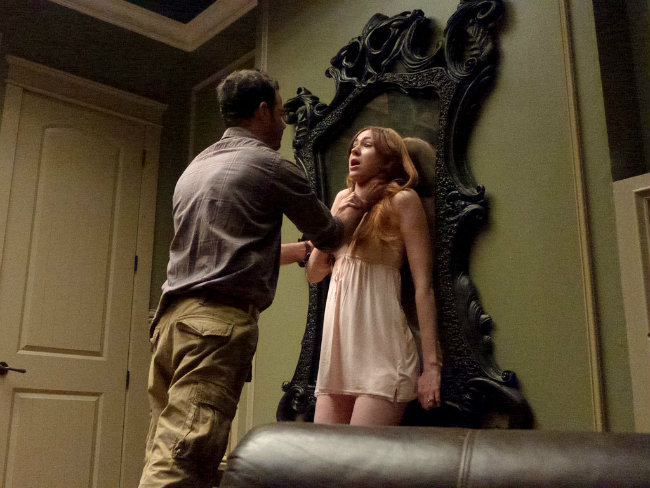
So, there’s part of the early story in Oculus where the dad has gone nuts, but isn’t killing anybody. He does, however, have the mom chained up in the bedroom and nobody is feeding the kids. The mom is also crazy and physically sick, so the daughter tries to call a doctor. The voice on the other end of the line tells her to have her father call. She tries a different doctor and the same voice says, “have your father call.” So…
It’s the mirror, intercepting the calls.
You’re on your A game today. So, the girl, and the whole family, including the father, is contained within the influence of this pernicious authority. You can reach out higher up the ladder of this system and all you’ll get is confirmation of the system.
But that’s just the ghost.
True. But it’s kind of a broad depiction of oppression. We even describe these kinds of ghosts as “oppressive spirits.”. You’re stuck in a self-confirming system that works against you. Maybe that’s what all ____isms are. Anyway, the girl is able to reach outside of the supernatural structure and runs into the more familiar White Ribbon scenario when she reaches a neighbor. The neighbor is concerned enough to come over and talk to the dad. And, of course, the dad turns on the charm and talks about having a round of golf one day (or something like that) and the neighbor winds up saying, “If you think this is bad, just wait till she turns sixteen! ”
Because men are evil!
A little bit, but not really. I mean, for one thing, it’s not like the dad is a big winner in this story. Within a few days he’ll be dead and his soul will be stuck in the mirror (perhaps). I imagine that the neighbor who misses his chance to prevent the whole tragedy drinks himself to death or something, as that would be a normal reaction. For another thing, it’s kind of The White Ribbon problem. We have these social structures that have helped us move from a Hobbesian state of nature to walking on the moon. We’ve got a lot invested in these structures. We want them to work. On top of that, what are we supposed to do? Barge into people’s homes waving a shotgun every time a kid complains about something?
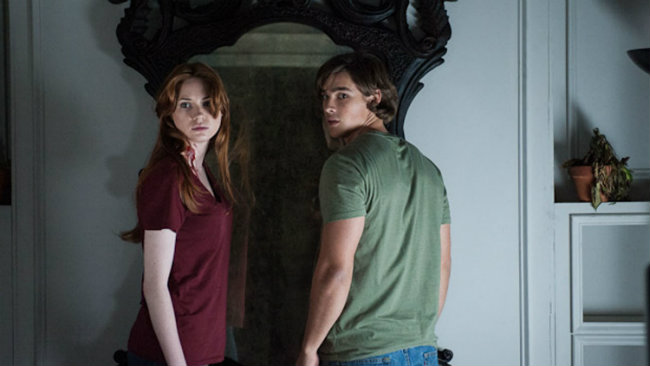
Well… we’ve progressed since The White Ribbon. We have social services now. The neighbor could have called them.
True. But the girl didn’t say she was abused. She said her mom was sick and that her dad wouldn’t take her to the doctor. Maybe, being a child, she didn’t effectively communicate how bad it was or maybe it sounded too crazy, so the neighbor was just like, “well, I’ll go over and have a look and make sure things haven’t gone totally off the rails.” And he’s going to be heavily prejudiced to believe things are fine, not because he wants his fellow patriarch to terrorize his family with impunity, but because he wants to believe that things are OK. Oh, and p.s. social services, the police, etc. are also powerful structures that have been known to abuse their authority, which is another reason to be reluctant to involve them.
And similar stuff with the psychiatrists convincing the brother that none of this ever happened?
Right. And this is an underlying tension in most horror movies. The reason people in the movies are so reluctant to believe in ghosts even after seeing a lot of evidence is the same reason, you’d be reluctant to. If ghosts and demons and vampires were real, everything we know would be called into question. Even if you saw such a thing with your own eyes, the most rational way to react to the information would be to question your own sanity.
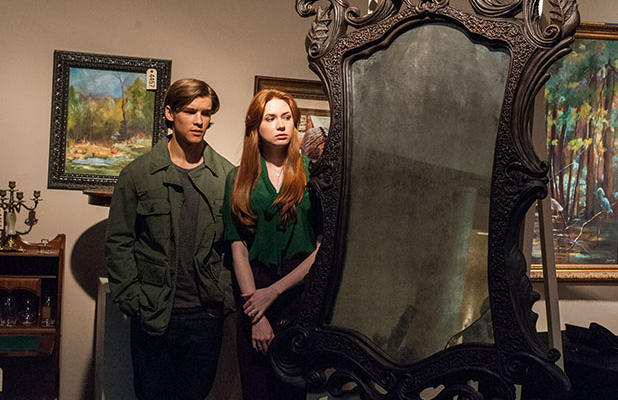
And so, this sets the stage for the brother and sister to have a Mulder/Scully adventure.
Right. The brother really articulates a lot of problems with memory and this reminded me of the whole Woody Allen scandal and the more general problems I read about during my obsession with the story. The brother goes over the problems with memory. We think of memory as a recording of what happened, but it is actually an account of what happened that we weave together. More of a painting than a photograph. It tends to be self-serving. It can be, and often is, completely false. Otherwise, sane people honestly believe, and clearly remember, that they were victimized in grandiose Satanic rituals or abducted by aliens. What is more likely, that their dad went crazy and the children invented an alternate account that was easier to accept or that a haunted mirror targeted their family?
So how do we know the truth?
We generally don’t. But the sister has a plan to try. While her brother was locked up, she identified the mirror and discovered that it had a long history of being involved with insanity, murder and suicide. She intends to impose objectivity on the mirror, which operates by distorting our subjective experiences. She’ll film it, record temperatures and use alarms to keep her and the brother in touch with reality.
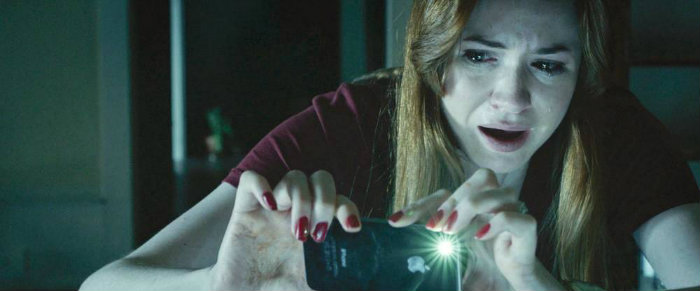
How does that work out?
Not too well, though she does convince her brother that the mirror is haunted. She gets caught up in an elaborate revenge fantasy. When she first obtains the mirror, she taunts it. Then she seeks to recreate the scenario of the first haunting, but with her in control, and with her ultimately “killing” the mirror. She wants to document all the wrong doing and prove that she is right. She wants to control and largely create the narrative.
That was her first mistake. It’s like in Goodfellas. When the mob decides to get you, they just turn out your lights before you ever know about it. All the yelling and gun waving is for the silly cops.
Right. Also, once the mirror controls their perceptions, nothing else matters. All science, technology and history become irrelevant. Neither the characters nor the viewers really know what happens during the middle 80% of the movie. We just see perceptions. We see more mundane examples of this all the time. 98% of scientists can agree on X. Social scientists can compile mountains of data showing Y. Journalists can take video and photos of Z. But if powerful entities can convince enough of the public that X,Y and Z are false, it doesn’t matter one bit.
And so…
We struggle to find the right lenses and frames through which to view reality: patriarchy, feminism, science, superstition, left, right… thinking that if we can just find the right combination, we can remove the horror of our existence from the picture. But we don’t have the control we aspire to. Our fundamental perceptions are malleable and flawed. Even if we could control our own perspective, and even if it were objective, the world we were trying to contain would overwhelm us. Truth, to the extent that we can access, let alone control it, doesn’t defeat evil.